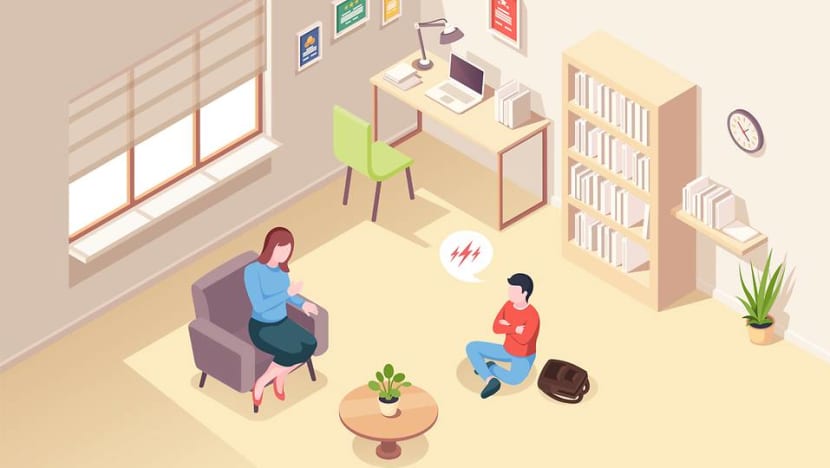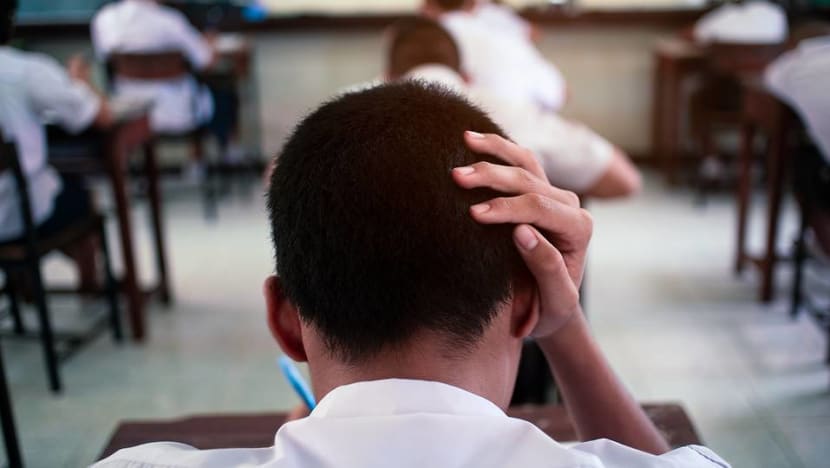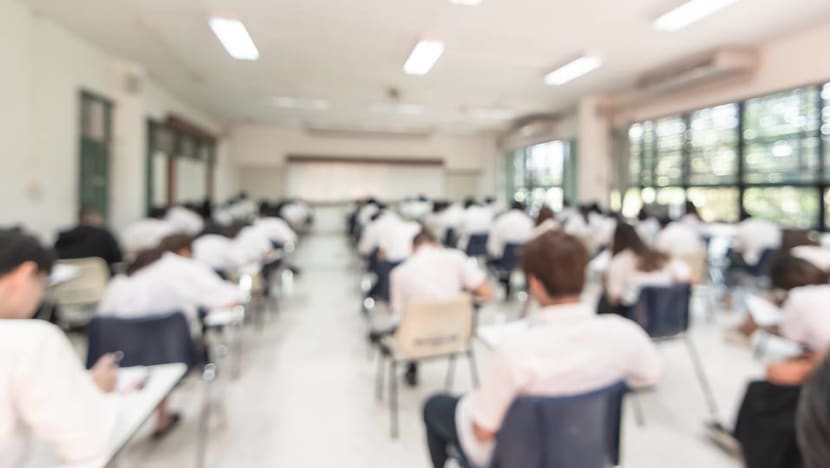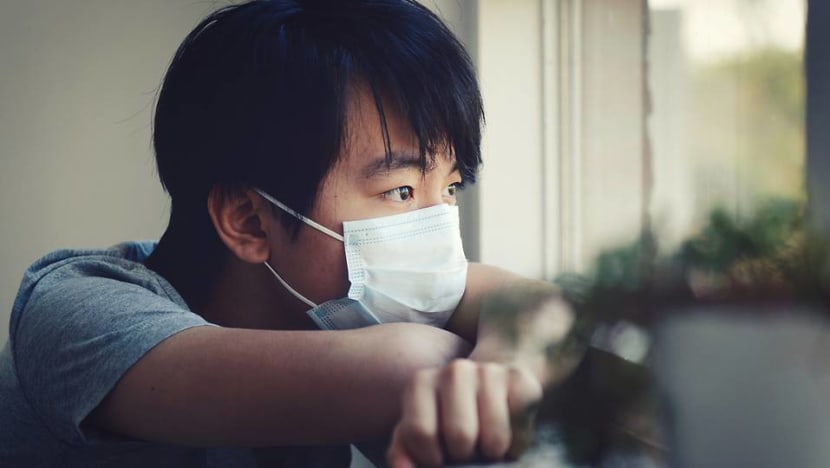‘With school counsellors, it’s really hit-or-miss’: Behind the challenge of safeguarding student mental health

There is a disparity in student experiences when it comes to school counselling. (Photo: iStock)
- Common complaints from students were that counsellors belittled problems or ‘snitched’ on them, but some had positive experiences.
- Teachers said that having one or two school counsellors is insufficient and does not offer choices to students.
- Teachers to receive enhanced training in mental health literacy, but some questioned whether the ‘burden’ should fall solely on them.
- Beyond improving ratios and the quality of care, an attitudinal shift may be needed.
* denotes name changed to protect the person’s identity
SINGAPORE: When Jane* opened up to her secondary school counsellor about the cold wars and troubles she was having with some close friends, she was told that “life’s like that”.
That was the then 14-year-old’s first session.
“I felt ignored, like (school counselling is hopeless) even if I bring up my problems,” said Jane, now 17 and in her first year at junior college.
She had been “mandated” to attend counselling because she was frequently late for class and did not submit homework on time. She recalled her form teacher telling her outside the classroom, in full view and within earshot of her classmates, that a session had been arranged to address her tardiness.
“It brings the idea that those who aren’t faring well have some problems and need to see the counsellor, rather than (the idea that) people … want to see a counsellor because of personal reasons,” she said.
After three compulsory sessions on her time management — none of which circled back to the issue with her friends — Jane did not hear from the counsellor again.
Then there is the contrasting experience of Hanna Lee, 19, who was asked to see a counsellor when she was in Secondary 2 for frequent truancy.
“It wasn’t that I didn’t want to go to school. I just had trouble with getting there regularly,” she said.
Her form teacher, who was aware of her family issues, texted or called her whenever she was absent to ask what was going on. One day, the teacher said: “If you need some help, I can arrange an appointment with the school counsellor.”
Ms Lee was relieved. “I was finally getting help,” she thought. In the counselling room, where a diffuser emitted a calming scent and artwork adorned the walls, she sat on a couch with cushions all around, feeling safe as she vented (sometimes for up to three hours).
She remembers learning breathing exercises and wanting to go to school so she would not miss an appointment.
“Sometimes I’d tell myself I just need to get through one more day, then I can go and release all of my frustrations,” she said. “As (the counsellor) got to know me more, instead of just (letting me) vent, she would give me some advice to help me cope.”
She saw the counsellor for three years, until she graduated from secondary school. Today, she is waiting to start her undergraduate degree in philosophy.
Jane and Ms Lee first shared their experiences on Reddit, where CNA Insider saw at least three threads asking about school counsellors.
While a handful of people shared positive experiences, there were common complaints that the counsellors belittled the students’ problems by making comparisons with others, or that the counsellors would “snitch” on them to their teachers or parents.
Some of the youths agreed that “with school counsellors, it’s really hit-or-miss”.
In the light of the pandemic and the recent tragedy at River Valley High School, the mental health of Singapore’s distressed youth is back in the spotlight. Last week, President Halimah Yacob said on Facebook that parents, schools and society were “ill-equipped” to deal with youths’ mental health issues.
With school counselling being one of the first ports of call for students, why is there a disparity in their experiences? Given the task of managing both students’ well-being and their academic standards, what challenges do schools face?

‘JUST FOCUS ON STUDYING’
When Ms Lee entered junior college, she decided to see the school counsellor to continue working on her issues. The experience this time, however, fell short of the mark when the counsellor harped on one question: “How is this going to affect your academic performance?”
“It felt like I wanted to talk about the issue (affecting me), but I’m constantly being redirected to talk about another thing,” she said.
Unlike the sympathetic ear she was given at secondary school, she felt it was “a lot more” about the practicalities at junior college.
“(The counsellor) said, like, ‘You have all these things, and you need to learn which one to focus on. You only have two years; you need to focus on academics.’ And then I was more stressed,” she said.
Students go to school counsellors because they need an escape from academics. But when they go to the school counsellor, they end up talking more about academics. It’s kind of counter-intuitive.
After that hour-long session, she never went back.
In response to a call via CNA Insider’s Instagram account for experiences with school counsellors, one reader shared that he constantly felt dismissed by the counsellors from his university’s counselling centre.
He was told things like, he was “not prioritising things” or he should “just focus on studying, and everything else will get sorted out”.
The final straw for him? “I was told I should be like other students and just study, and not waste her time and mine,” said the reader, who wished to remain anonymous.
He “struggled through a few more years” while dealing with his parents’ marriage issues, the family business and a break-up, and the centre did not reach out to him. He eventually quit school.

DO COUNSELLORS REALLY ‘SNITCH’?
Besides feeling that their worries or stressors were “downplayed”, many people in the Reddit threads were concerned that counsellors would “snitch” on students to their teachers and, especially, their parents.
“(Students) are scared to tell (their) parents. They don’t want to disappoint the parents, or parents could be the source of their pain,” noted former school counsellor Gary Koh.
According to him, all records are confidential, and there are only three instances when counsellors must break confidentiality: Harm to self, harm to others or when the law comes into question.
But students believe what their peers have experienced or what they hear through the grapevine. Jane, who was sent to counselling for tardiness, shared about being bullied with her counsellor. The next thing she knew, her teachers asked her for the names of those involved.
“I definitely was a bit surprised,” she said, as she was not told about the ground rules for confidentiality. While she was not too affected, as the bullying incident was “kind of small”, a friend who confided her sexuality to the same counsellor had it worse.
“She got scolded and punished by her parents. The counsellor reported it to the teachers, who called her parents,” said Jane.
Another student, speaking to CNA Insider on condition of anonymity, said the experiences shared on Reddit “confirmed (her) fears” and that school counselling was “not very helpful in general”. Others agreed that “snitching incidents limit the ability of students to share their problems”.
However, some students, like Ms Lee, were told at the outset when the counsellor would have to break confidentiality. So when she shared her suicide ideation with her counsellor some months later, she “knew what (she) was getting (herself) into”.
Teachers, too, find confidentiality hard to navigate. “Sometimes we do need to know, and counsellors may not be able to tell us anything,” said former secondary school teacher Rachel*, who left the profession last year.
“As a teacher, I’d ask the counsellor how the student’s doing. Is there any way I can help? But in terms of what actually goes on, counsellors aren’t supposed to (tell us).”
Where necessary, she used to ask the students directly. “If (the counsellors) feel the need to get parents involved, they’d also have to consult the student,” said Rachel.
Being informed beforehand made a difference for Phoebe Chew. She started seeing her counsellor in Secondary 3 as her teachers were concerned about her home environment.
About three months later, she was informed that her parents would be contacted, though her issues were not related to harming herself or others, or anything to do with the law.
“That was one of the worst nightmares any student could possibly want,” said Ms Chew, now 21 and studying social work and psychology at university. “But I think the school counsellor had enough concerns to raise them to my parents.”
In the end, it was still a “nightmare scenario” as her “parents weren’t happy”.
THE PERENNIAL STIGMA
In serious cases, said Rachel, when she did need to involve parents, that was when it became “a bit tough”.
“The resistance comes more from parents,” she said. “Because some parents refuse to believe their child needs help. They feel like, ‘Oh, it means (my child) is crazy.’”
All students CNA Insider spoke to also reported a sense of fear and shame when going to see the counsellor for the first time.
Marcus* remembers the feeling as he walked to the counselling room, which was located within what looked like a pantry area.
“It feels like a very shameful thing, and I guess being in a school environment, people gossip. I was really scared people would see me going to the counsellor and think something’s wrong with me,” he said.
This thought was also triggered by a remark made by his teacher, even before he considered going for counselling. In year two at junior college, Marcus experienced a bad break-up, and while on an overseas school trip, he broke down in the hotel lobby. His teacher was alerted.
“Basically, the teacher walked up to me and told me, ‘Actually, you shouldn’t beat yourself up over a girl. If you really can’t handle it, then I’ll give you the number of the school counsellor,’” recalled Marcus, now 21.
Hearing this, he thought, “Am I just emotionally weak? If I go to the school counsellor, it kind of means I’m weaker than everyone else.”

But because he was “screwed up”, he decided he could use some help from the counsellor, even if it felt “lame” and “emasculating”.
Some students also said efforts to inform students about school counselling felt “almost like an afterthought”.
“Whenever the school mentions (it), it’s always very briefly, at the bottom of the (presentation) slide. ‘Oh, by the way, we have a school counsellor, this is the number, the email. Then okay, next slide,’” Ms Chew said.
Others said the counsellor’s office was “tucked away on an upper floor of the school” or “just some room next to the vice-principal’s office”, so it hardly felt prominent, much less welcoming.
But in Ms Lee's secondary school, mental health did not seem a taboo, thanks to the counsellor’s efforts to de-stigmatise seeking help. There were “posters all around”, and the counsellor regularly went on stage during assembly to introduce herself and say how she could be reached.
She also walked around school, especially during recess, and smiled or waved at students she knew. If they gave any indication of being open to talk, she would walk up and check in with them.
“Most of the students knew that she was a school counsellor, and they were all very open to her talking to students and being around,” Ms Lee said.
RATIO OF COUNSELLORS TO STUDENTS
After her mixed experiences with school counselling, her heart still goes out to the counsellors “because they’re trying their best”. With “one, at most two” counsellors serving a cohort of 800 to 1,000 students, she “understands the mental burnout”.
“At this age, 13 to 18, it’s the period when teens go through the most mental instability, like stress and social anxiety. And pressures really get to them, maybe because their brain hasn’t developed yet or whatever,” she said.
“That’s … when, I feel, the most help needs to go out to students. But looking at the numbers alone, it’s so inadequate.”
On July 27, in the wake of the River Valley High School incident, Education Minister Chan Chun Sing said in a ministerial statement that all schools now have at least one school counsellor, while some have two.
“Where feasible, we’ll recruit more school counsellors or ‘re-role’ suitable educators, to augment the counselling support network,” he said.
READ: MOE to strengthen support networks in schools; all teachers to get enhanced training on mental health literacy
Teachers told CNA Insider that having one or two school counsellors is insufficient for their schools, especially with the “increasing volume of students who need mental health support”.
“My school has two counsellors, and it’s not enough. They don’t just handle diagnosed mental health issues but all the other anxieties and misbehaviours daily, from all sorts of students who may just be having a bad day,” said Cindy*, a secondary school teacher.
Ex-teacher Rachel said school counsellors’ heavy caseloads have resulted in a prioritisation of “urgent cases”, like those with suicidal tendencies, over others.
“It makes sense, but there are students who are struggling with social interactions, for example, which are important too. And these things can build up and escalate,” she said.
“I know they’re doing their best already, but there isn’t enough of them to manage.”
Another teacher, David*, is at a school with a population of “about 900 to 1,000” and one school counsellor available. “Even if we increase to two counsellors, we’re still talking about one counsellor to 400, 500 students,” he said.
Noting that school counsellors often go above and beyond to care for students, he cited how his school counsellor walked one of his students with mental health issues to class every day to build trust and help her overcome her anxiety.
“One case already takes a lot of energy,” said David.
Compared to other developed countries, Singapore’s ratio of students to counsellors appears to occupy a lower rung. Research last year showed that schools in Ireland with more than 500 students must have one school counsellor per every 250 students, like in the United States.

Some schools in Singapore, however, may have more school counsellors than others. Mr Koh, who was a counsellor at an Integrated Programme school for 10 years, said there was a team of seven counsellors to a cohort of 4,300.
That is a ratio of one to 600, which he felt was already “overwhelming” at times. “It’s mentally tiring. All you need to have is one student who has depression — it’d suck the life out of you,” he said.
He eventually left his job owing to the “trauma” of encountering “too many” suicide cases in and out of school. “It takes its toll on you,” he said. “I needed to disconnect for my own well-being,”
Even so, he acknowledged that he was “privileged” to have worked in a team of counsellors as it offered more choices to students.
“It’s like seeing a doctor, right? All doctors are trained, but sometimes you go to one doctor, and you don’t find him helpful. Then you go to the next doctor down the road, you get the same medication, but something is different,” he said.
“The benefit of having a pool of counsellors (is having) different modalities, different styles, different personalities … So a student who may not quite work well with me can find another counsellor whom (he or she) can connect better with.”
David agreed as he has had a few students who have reflected that they had negative experiences with the school counsellor.
“Counselling is a very intimate kind of relationship. Sometimes it’s just personality differences, (but) if they don’t like it, it becomes a bad experience for them. That’s the disadvantage of having only one school counsellor in the school,” he said.
“If they have a bad experience, they won’t be so keen to explore counselling again.”

EFFECTIVENESS OF TEACHER-COUNSELLORS
As part of plans to strengthen schools’ capabilities, the Ministry of Education (MOE) aims to deploy more than 1,000 teacher-counsellors in the next few years, up from the 700-plus in schools now.
Teacher-counsellors are teachers who have received additional training so they can help students who are dealing with more challenging social-emotional problems, such as grief and loss.
Speaking in Parliament this week, Mr Chan said: “Some of (the new teacher-counsellors) will volunteer, and some of them will be identified to take on additional training to become teacher-counsellors
“Instead of teaching two subjects, they may reduce the load of teaching … to even become one subject. But they take on the additional responsibilities within the school to help in the counselling service provided.”
While having more teacher-counsellors may help to take some load off school counsellors, experts CNA Insider spoke to said playing a dual role can be “conflicting” for teachers sometimes.
“Though there are similarities (between both roles) like caring for another person, the manner of it is very different. For teachers, the most well-developed (skills are) sharing and educating,” said Counselling and Care Centre therapist Charlotte Chen.
“(For) a counsellor, one of the most foundational skills is the ability to listen empathically to the essence of what the person is saying, and also to observe the effect of the conversation on the other.”
She added that it will be a “real challenge” for teachers to “switch hats” and hold back on sharing, even if well-intentioned.
Mr Koh observed that even though the school he was with had teacher-counsellors, more students chose to see school counsellors for help.
“I think students still struggle, (thinking), ‘But this is my teacher? This teacher teaches this subject … I don't really want that,’” he said.
This was echoed by former Nominated Member of Parliament (NMP) Anthea Ong, who advocated prioritising mental health during the Budget 2020 debate.
“The question to ask here is: What’s the primary role of our teachers in schools? If they see their primary role as competency-giving, competency may sometimes be in conflict with students’ well-being,” she told CNA Insider.
“If you aren’t competent (academically), you’re sometimes made to feel terrible in class — and sometimes unintentionally by the teachers.”

Recalling her time as a teacher, Rachel said the biggest “pressure” came from having to keep her students’ grades up.
“I remember a few departments were called down to the principal’s office because those subjects didn’t do well (in examinations),” she cited. “If your class didn’t do well, there was something you did wrong.”
Although there have been efforts to reduce the emphasis on academic results, such as the reduction in the number of examinations and assessments and, most recently, the removal of Common Last Topics from this year’s N, O and A level exams and year-end school exams, Rachel said the need for testing is “ingrained in parents”.
READ: Fewer exams, assessments in schools to reduce emphasis on academic results: MOE
And rather than wearing many hats, Cindy emphasised that “teaching itself is already a full-time job”, something she would like to be able to excel in “because that’s what I signed up for,” she said.
Joyce* concurred, saying that she will never choose to be a teacher-counsellor. “I chose to teach history because I’m good at it, and I love it. You wouldn’t ask a counsellor to teach history on the side, right?”

David, on the other hand, sees the benefits of equipping himself with the basics of counselling.
“For most teachers, you’d have some form of relationship with the students. I think going for it is a good thing … so that I can have a better journey with my students,” he said.
According to him, teachers selected to become teacher-counsellors attend “a full five-day course”, which he wanted to go for when it was offered to him. But he could not, owing to his heavy workload.
TEACHING AND COUNSELLING ROLES BLURRED
As it is, however, some teachers who are not teacher-counsellors have already been acting as counsellors if students are more comfortable talking to them, Cindy said.
“It falls on the teacher to do the follow-up on their mental well-being, as well as triangulate with the parent. We end up wearing many hats: Teacher of knowledge but also a teacher of values and social well-being, and also a teacher-as-caregiver.”
So when Mr Chan said in his parliamentary speech that all teachers will receive enhanced professional development on mental health literacy “as a baseline”, to further strengthen teachers’ abilities to identify and support students in need, some teachers CNA Insider spoke to questioned if the “burden” of taking care of students’ mental well-being should fall solely on their shoulders.
In an email response to CNA Insider’s queries, the MOE said that the enhanced efforts will include areas such as understanding and recognising symptoms related to common mental health issues and suicide, strategies to de-escalate strong emotions and impulsive behaviour, and facilitating classroom conversations on mental health with sensitivity.
“The new measures come from the underlying assumption that teachers have, or could be equipped with, the ability to diagnose and competently deal with students with mental health issues under our charge,” said Cindy, a secondary school teacher.
“With poorly defined boundaries of where a teacher’s role begins and ends with regards to mental health, the culpability in the case of a repeat incident will fall onto teachers,” she added.
Ideally, teachers and school counsellors would interact in a symbiotic relationship, said Inner Light Psychological Services clinical psychologist Tracie Lazaroo.
She explained that both teachers and school counsellors act as “gatekeepers”, but they possess “unique resources” that will help with their students’ well-being.
“Teachers are equipped with unique student-related knowledge including how they have been performing in class, their temperament, behavioral tendencies and level of interaction with other students,” Dr Lazaroo said.
According to the MOE, teachers are trained to engage students to understand their issues, but should refer them to school counsellors should they need “extensive support”.
Counsellors, Dr Lazaroo said, would be equipped with “more in-depth interviewing skills”. They would also be able to “create support strategies for the student” and make referrals to community services for long-term support.
Hence, some teachers, like Joyce, feel like even with additional training, they can never be fully equipped to take care of students’ mental health, or that there is a limit to what they can do.
“You care for them, you truly do care for them. And it breaks your heart to see them in this position. (But) we all have different thresholds and once you pass that, I'm like, I don't know what to do. I don't know what to say,” said Joyce, who teaches in a secondary school.
“Genuinely, I'm only comfortable to a certain extent. I just don't have the eloquence to phrase things in a way that would help a person and I think it’s a skill to be able to talk about (mental health) in a way that's helpful to a teenager.”
“That’s a skill that counsellors have.”
Cindy agreed, noting that the expectation that teachers should be utilised to tackle mental health “hints at a more systemic issue regarding the perception of teachers and their duties”.
“As much as we wish we have the capacity to do everything that is asked of us, the reality is that the more roles we take on, the worse we are going to perform across all of them.”
‘TEACHING IS JUST 20 PER CENT OF THE JOB’
The most common grievance for teachers who spoke to CNA Insider is having to care for students’ well-being on top of a crushing workload.
“The preparation for work was tough and then it’s worse when you have so many students - having to keep track of their work, keep track of their well-being, and even just their names sometimes,” said Rachel, who had had eight classes of 40 kids at one point.
In her Facebook post, Mdm Halimah also said that for teachers already overloaded with work, it is not possible for them to "delve deeply" into the issues affecting one child as that would require close monitoring, observation and engagement.
As for teacher-counsellors, Rachel observed that even though those in her school were “slightly offloaded” in terms of teaching responsibilities, there were still “a lot of backend” things that they had to attend to.
“I always tell people that teaching is really just 20 per cent of the job. The rest is administrative, like doing lesson plans, classroom management and marking.”
“Even if you have less classes to teach, when it comes to marking papers, testing exams, everybody has their load.”

David also questioned if teacher-counsellors can successfully juggle the dual role if the number of teachers in a school does not increase - especially when there is subject-based banding in school.
Subject-based banding was introduced in 2019, where students will take subjects at a higher or lower level based on their strengths.
READ: 28 secondary schools to pilot full subject-based banding from 2020
“More banded classes means you’ll need more teachers. It’s not going to be easy to offload teachers to really focus on being a teacher-counsellor.”
Additionally, what is “missing from the conversation” of mental health in schools is the mental well-being of teachers, Cindy shared.
“Mental health issues among teachers are very present, yet rarely talked about … I don’t see how we can create a safe space to discuss mental health issues when we ourselves are situated in an environment that discourages it,” she said.
Another teacher, who also declined to be named, described the mental health of teachers to be “a very sad affair right now”.
"Despite all the positive media coverage of our successful pivot to home-based learning (HBL), the reality is that we’re struggling in schools to keep pace with the ever-changing Safe Management Measures, oscillations between HBL and physical lessons, and the perennial need to still keep apace with the syllabus.”
“It’s a whole new workload altogether and I think at this point teachers are just barely managing.”

Ms Ong urged that “we must not look at the student’s mental well-being without looking at the teacher's well-being” as well.
“A student who is not well affects the wellbeing of a teacher and a teacher who is not well will also affect the students. These two things need to be looked at in totality.”
WHAT WOULD MAKE COUNSELLING A VIABLE OPTION?
One 19-year-old student, who wishes to be anonymous, suggested offering students email or phone call services like what is done at Samaritans of Singapore, such that students who are afraid of physical sessions may have an option.
She also suggested having routine mental health checkups, such that students who may be afraid to walk into the counsellor’s room have a space to speak up under the guise of a formal school event.
Some schools, like Marcus’ junior college, have school leaders offering peer support. Marcus, who holds a leadership position himself, was taught some techniques on how to spot students who might need mental health support or what to do when a student confides in him.
“I think that’s also a very important part because ultimately, most people turn to their peers when they are facing issues,” he said. “And it definitely would help to get students to know how to help each other, and in really serious cases to flag it out.”
But he admits that the job can be overwhelming, especially with the already heavy academic stress and workload.
Above all, all students CNA Insider spoke to echo making school counselling more approachable, with a strong emphasis on confidentiality.
“If there’s no approachability then no one would even see the school counsellor,” said Ms Lee. It starts with making the counsellor more visible to students, she said. “If you don’t know how to see the school counsellor, you might not want to ask the teacher for fear of judgement.”
And while there may be a mismatch in expectations in seeing a school counsellor, another student, Ms Chew, shared that it is helpful for students to share what they hope to achieve out of counselling. But not all students may have the self-awareness or knowledge to do so, she said.
“These are students, it’s probably their first time starting this kind of thing. So I hope that (school counsellors) will be the ones taking the lead in asking the students, guiding the students to realize what they want,” she said.
MORE TRAINING FOR SCHOOL COUNSELLORS?
Other than the lack of resources in schools, Mdm Halimah also said that school counsellors “may not be well-trained on issues affecting mental health”.
In the 2013 American Counselling Association report on the counselling landscape in Singapore, it also noted that while there are increasing numbers of individuals entering the field with basic training, there is “limited opportunity for high quality clinical supervision”.
In its email response, the MOE said that school counsellors receive monthly professional supervision, peer support group sessions and individual clinical supervision from lead school counsellors.
“These have been continuing via online platforms in the midst of COVID-19 restrictions.”
The MOE added that school counsellors also deepen their knowledge through workshops and courses such as “suicide assessment and intervention, psychological first aid, addiction, child abuse or family violence, and multicultural issues”.
Even with the measures in place, Ms Chen questioned if the current clinical supervision that school counsellors have access to is sufficient, especially when “they probably already don’t have many colleagues to bounce off” ideas and experience, as most schools only have one school counsellor.
At Counselling and Care Centre, she conducts supervised training for professionals in the field and she has been working with some school counsellors who want to seek “extra supervision”.
“We often encourage them to record their sessions - with the permission of their students - and showcase segments of their work so we can really look at the skills.”
From her experience working with school counsellors, she noticed that it is “really hard” for them to get more support and training to improve their skills when they have heavy caseloads and are constantly “firefighting with higher risk cases”.
“In this line of work, we can’t just rely on our degrees. There’s so much more conversation that needs to be carried out to support professionals in working effectively with people,” she added.
“The most dangerous thing is when practitioners practice on their own.”
CHANGING PERCEPTIONS OF MENTAL HEALTH
In schools, there is the Character & Citizenship Education (CCE), which this year had a refreshed syllabus that gives more focus on mental wellness and peer support. But teachers find that it is merely “scratching the surface”.
READ: Schools to offer mental health lessons from 2021; more trips to Asian countries
“The reality of the execution is … it might not always work because kids are tired (from other classes). They don’t want to hear me talk about how to be a good person. It’s not something that you can learn by sitting down and listening,” said Joyce.
Rachel added: “Teachers are so busy teaching other lessons that during CCE lessons, we just literally deliver whatever the school gives us. It’s really hard to engage the kids in a manner that is real and that they can fully relate to.”
This is why she also felt that her students took CCE as “a joke”.
“Students don't feel like they can ask anything. It's very hard in a group of 40 - not every child wants to speak up, not every child wants to engage. Whereas if you had smaller groups, it’ll be more intimate.”
While part of the refreshed CCE syllabus teaches “resilience and social-emotional well-being” - which includes having a sense of gratitude and appreciation - Cindy felt that it perpetuates “toxic positivity”.
“Before we get to resilience there are so many other logical steps a person struggling with his or her mental health can go through - acceptance, for example. We really can't teach resilience through CCE. Inspiring videos and powerpoint slides can only go so far,” she said.
Perhaps, beyond improving ratios and the quality of care, it is an attitudinal shift that is needed in taking care of students’ - and even teachers’ - mental health.
“We need to be mindful of using mental resilience and mental well-being interchangeably. We really need to stop talking about resilience as if (poor mental health) is just something to snap out of,” said Ms Ong.
“There isn’t a strength more powerful than being able to deal with your own vulnerability, and I think we understate that.”
Where to get help:
Samaritans of Singapore Hotline: 1800 221 4444
Institute of Mental Health’s Helpline: 6389 2222
Singapore Association for Mental Health Helpline: 1800 283 7019
You can also find a list of international helplines here. If someone you know is at immediate risk, call 24-hour emergency medical services.

















